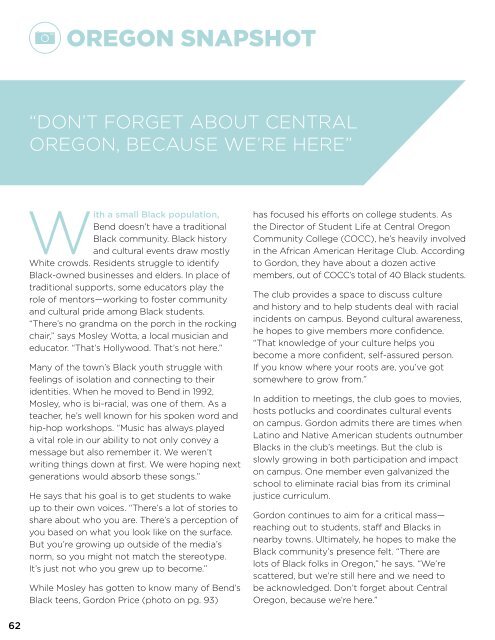State-Of-Black-Oregon-2015
State-Of-Black-Oregon-2015
State-Of-Black-Oregon-2015
You also want an ePaper? Increase the reach of your titles
YUMPU automatically turns print PDFs into web optimized ePapers that Google loves.
OREGON SNAPSHOT“DON’T FORGET ABOUT CENTRALOREGON, BECAUSE WE’RE HERE”With a small <strong>Black</strong> population,Bend doesn’t have a traditional<strong>Black</strong> community. <strong>Black</strong> historyand cultural events draw mostlyWhite crowds. Residents struggle to identify<strong>Black</strong>-owned businesses and elders. In place oftraditional supports, some educators play therole of mentors—working to foster communityand cultural pride among <strong>Black</strong> students.“There’s no grandma on the porch in the rockingchair,” says Mosley Wotta, a local musician andeducator. “That’s Hollywood. That’s not here.”Many of the town’s <strong>Black</strong> youth struggle withfeelings of isolation and connecting to theiridentities. When he moved to Bend in 1992,Mosley, who is bi-racial, was one of them. As ateacher, he’s well known for his spoken word andhip-hop workshops. “Music has always playeda vital role in our ability to not only convey amessage but also remember it. We weren’twriting things down at first. We were hoping nextgenerations would absorb these songs.”He says that his goal is to get students to wakeup to their own voices. “There’s a lot of stories toshare about who you are. There’s a perception ofyou based on what you look like on the surface.But you’re growing up outside of the media’snorm, so you might not match the stereotype.It’s just not who you grew up to become.”While Mosley has gotten to know many of Bend’s<strong>Black</strong> teens, Gordon Price (photo on pg. 93)has focused his efforts on college students. Asthe Director of Student Life at Central <strong>Oregon</strong>Community College (COCC), he’s heavily involvedin the African American Heritage Club. Accordingto Gordon, they have about a dozen activemembers, out of COCC’s total of 40 <strong>Black</strong> students.The club provides a space to discuss cultureand history and to help students deal with racialincidents on campus. Beyond cultural awareness,he hopes to give members more confidence.“That knowledge of your culture helps youbecome a more confident, self-assured person.If you know where your roots are, you’ve gotsomewhere to grow from.”In addition to meetings, the club goes to movies,hosts potlucks and coordinates cultural eventson campus. Gordon admits there are times whenLatino and Native American students outnumber<strong>Black</strong>s in the club’s meetings. But the club isslowly growing in both participation and impacton campus. One member even galvanized theschool to eliminate racial bias from its criminaljustice curriculum.Gordon continues to aim for a critical mass—reaching out to students, staff and <strong>Black</strong>s innearby towns. Ultimately, he hopes to make the<strong>Black</strong> community’s presence felt. “There arelots of <strong>Black</strong> folks in <strong>Oregon</strong>,” he says. “We’rescattered, but we’re still here and we need tobe acknowledged. Don’t forget about Central<strong>Oregon</strong>, because we’re here.”62


